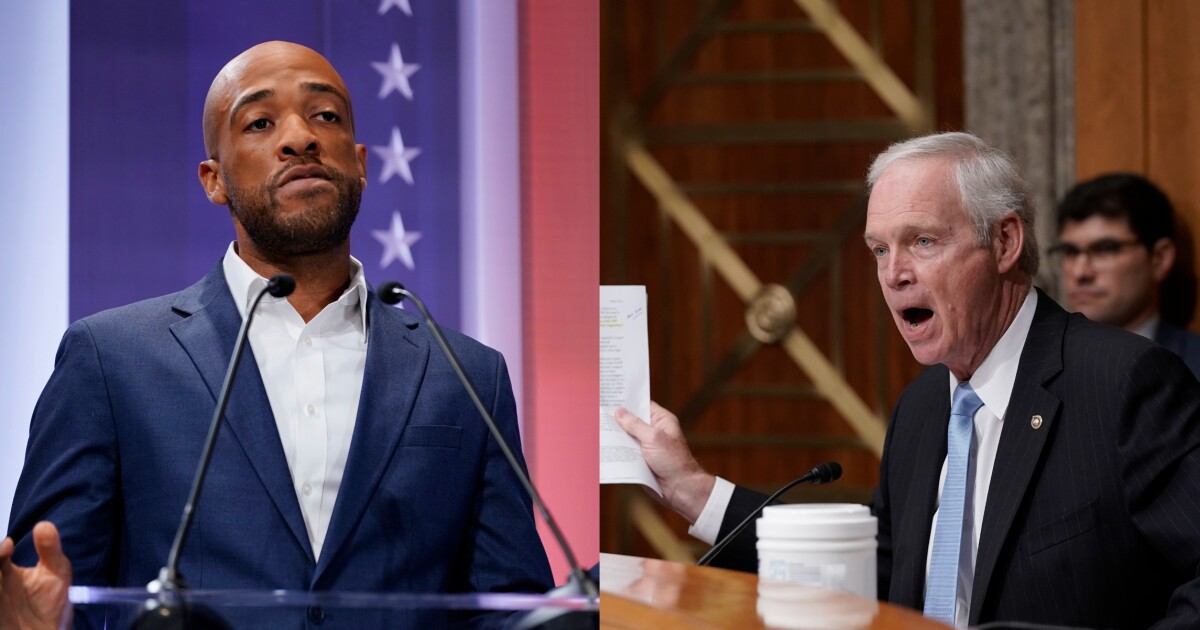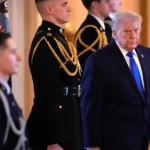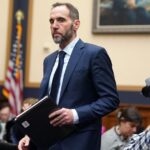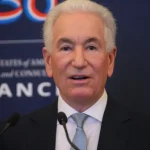

Sen. Ron Johnson (R-WI) and his Democratic challenger, Lt. Gov. Mandela Barnes, clashed on crime and Jan. 6 as they tussled during their first debate on Friday.
Moderator and veteran newscaster Jill Geisler peppered them with questions over a plethora of issues, but crime, democracy, and abortion loomed large as Johnson and Barnes faced off during the largely civil event. Here are five key takeaways moments from the debate.
RON JOHNSON AND MANDELA BARNES TO FACE OFF IN FIRST WISCONSIN SENATE DEBATE
Jan. 6 and former Vice President Mike Pence
Throughout his reelection bid, Johnson has been dogged by questions about Jan. 6. In particular, the senator has faced scrutiny over a text exchange he had with one of former President Donald Trump’s lawyers on the day of the Capitol riot. The lawyer asked Johnson to deliver a package to then-Vice President Mike Pence.
At the time, allies of Trump were trying to pressure Pence into playing ball in an effort to overturn the results of the 2020 election, but the vice president resisted and refused to try and send back slates of electors to the states on Jan. 6. During the debate, Johnson was asked point blank if Pence did the right thing by refusing to capitulate to Trump’s demands.
“Yes, President Biden is now president of the United States,” Johnson said.
The senator also professed his support for reforms to the Electoral Count Act, legislation aimed at making it harder to overturn a presidential election.
.@RonJohnsonWI says during debate w/ @TheOtherMandela he would support legislation moving through the Senate to reform the Electoral College certification process and prevent future Jan. 6, 2021 controversies.
— David M. Drucker (@DavidMDrucker) October 8, 2022
Barnes tries to flip the script on crime by harping on Jan. 6
Going into the debate, it was clear that Johnson viewed crime as an Achilles’ heel for Barnes. His campaign had long blanketed the airways with ads zinging the Democrat by tying him to the “defund the police” movement.
After Johnson leaned in on saying the Democrat has a record of supporting the idea, though he acknowledged his rival never said the “word,” Barnes quickly moved to shift the focus to Jan. 6.
“I’m sure he didn’t have the same interaction with [the] 140 officers that were injured during the Jan. 6 insurrection. One officer was stabbed with a mental stake, another crushed between a rock wall and door. Another hit in the head with a fire extinguisher,” Barnes said. “So when we talk about respect for law enforcement, let’s talk about the 140 officers that he left behind because of an insurrection that he supported.”
Johnson said he condemned the Jan. 6 riot and noted that he “also condemned the 570 riots that occurred during the summer.”
WI Lt. Gov. Barnes (D) responds to criticisms of his police record by slamming Sen. Johnson’s (R) 1/6 support:
“1 officer was stabbed with a metal stake. Another crushed … When we talk about respect for law enforcement, let’s talk about the 140 officers he left behind.” pic.twitter.com/HT0QuZvro5
— The Recount (@therecount) October 8, 2022
Johnson bristles at Social Security attacks
When asked about the most common misconceptions of the campaign cycle, Johnson name-dropped Social Security. Throughout the debate, Barnes chided Johnson for describing Social Security as a “Ponzi scheme.”
The senator also fielded questions from the moderator about his past assertion that Social Security should be budgeted as a discretionary program rather than as a mandatory expenditure so that Congress could have more control over its spending.
“What I’ve been saying is that we should look at all spending so that we can prioritize. And Social Security and Medicare would be at the top of the priority list. I have never ever said I would cut it or put it on the chopping block. That is a false attack,” Johnson said.
In contrast to Johnson on the issue of Social Security, Barnes said he would bolster taxes on the wealthy to strengthen the program and forestall insolvency.
Barnes invokes his mother to defend abortion rights
Abortion has been ranked the second most important issue in the race, with 16% of voters putting it at the top of their list, eclipsed only by inflation at 20%, according to a recent Fox News poll. Barnes has panned Johnson on abortion throughout the campaign trail, and during the debate, he shared a personal story from his mother.
“I’m an only child, but I’m not my mother’s only pregnancy. Before I was born, my mother had a complicated pregnancy and she had an abortion. She shared her story because she wanted others to know that they aren’t alone and then it was her decision to make,” he said.
Johnson countered that he backed the overturning of Roe v. Wade to relegate the sensitive matter back to the states. Wisconsin currently has an 1849-era abortion ban on the books. He suggested that there should be a referendum on the issue to let voters have their say. Johnson also criticized Barnes for supporting “no limits on abortion whatsoever,” even until “the moment of birth.”
Inflation and energy take a back seat
Perhaps the most notable aspect of the debate was the issue that wasn’t asked by the moderator, inflation, though the topic was briefly raised by the candidates. Poll after poll has pegged soaring prices gripping the country as a top midterm election issue for voters.
Moderators briefly touched on soaring gas prices, asking the candidates about the recent OPEC+ decision to slash oil production, which will likely usher in a wave of gasoline price hikes at the pump for millions of voters. Barnes and Johnson hewed closely to the typical Republican-Democratic trenches on that issue, with Johnson calling for energy independence and Barnes calling for a more emphasis on renewable energy.
CLICK HERE TO READ MORE FROM THE WASHINGTON EXAMINER
Johnson is widely regarded as one of the most vulnerable incumbent senators in the country, given the political dynamics of Wisconsin. He has a 3-point lead in the latest RealClearPolitics polling aggregate. Given the 50-50 split in the Senate, the race could prove paramount to determining the balance of power in the upper chamber.






